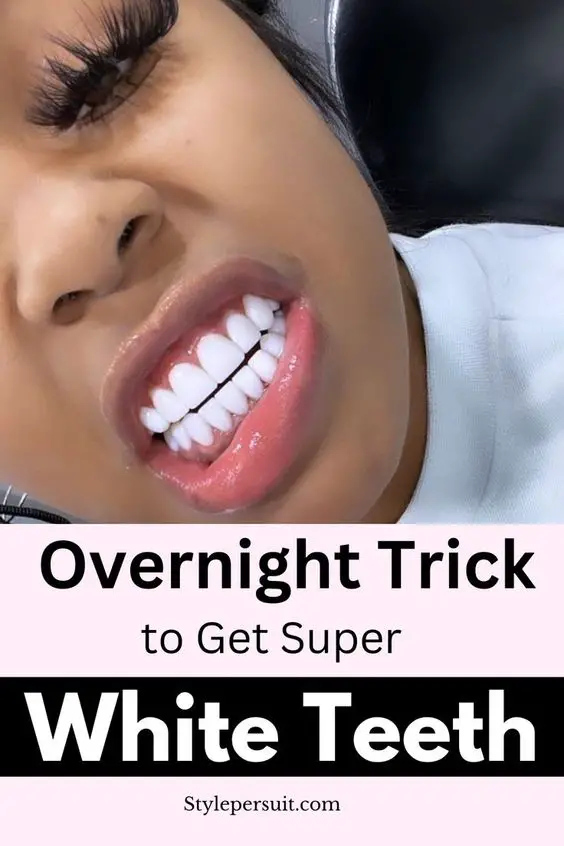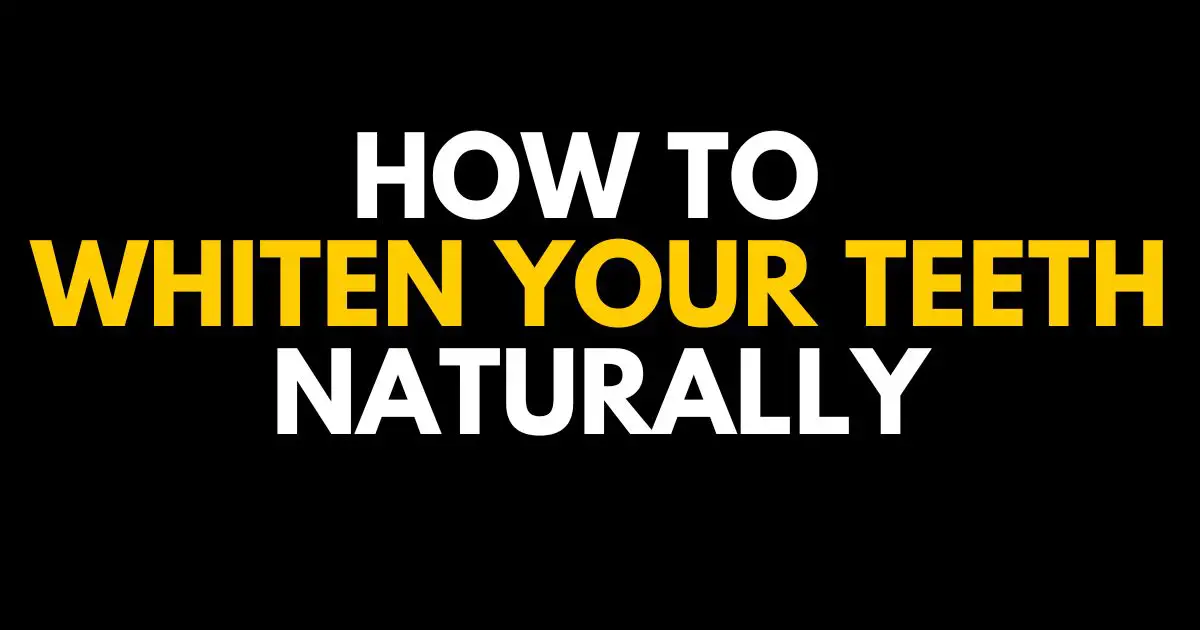A bright, white smile can significantly enhance our appearance and boost our self-confidence. While there are many over-the-counter teeth whitening products available, they often contain harsh chemicals that can damage the enamel and lead to tooth sensitivity.
Luckily, there are several natural methods for whitening teeth that are both safe and effective. Continue reading to learn more
Reviewed’s editors independently select recommendations. If you make a purchase through the provided links, we may earn a commission from the transaction, along with our publishing partners.
What Causes Yellow Teeth
Yellow teeth can be caused by various factors:
- Foods and Drinks: Certain foods and drinks can stain teeth, such as coffee, tea, colas, red wine, berries, and tomato sauce. These items contain pigments called chromogens that can adhere to the enamel and cause discoloration over time.
- Tobacco Use: Smoking cigarettes or using other tobacco products can lead to the yellowing of teeth due to the nicotine and tar present in tobacco.
- Poor Oral Hygiene: Inadequate brushing and flossing can allow plaque and tartar buildup on the teeth, leading to discoloration.
- Age-Related Factors: As we age, the enamel on our teeth can wear away, revealing the yellow dentin layer underneath. Additionally, the accumulation of stains over time can contribute to a yellow appearance.
- Genetics: Tooth color can be influenced by genetics, with some individuals naturally having darker or more yellowish teeth. If one or both of your parents have yellow teeth, it’s possible that you may have a similar tooth color.
- Medications: Certain medications, such as tetracycline antibiotics, can cause tooth discoloration when taken during childhood.
- Dental Conditions: Certain dental conditions, such as enamel hypoplasia or thin enamel, can make teeth appear more yellow.
How to Whiten Teeth Naturally
1. Oil Pulling
Oil pulling is an ancient Ayurvedic practice that involves swishing oil in the mouth to remove plaque and bacteria. The most commonly used oil for this technique is coconut oil due to its natural antimicrobial and anti-inflammatory properties. Here’s how to do it:
- Take a tablespoon of organic coconut oil and swish it around in your mouth for about 15-20 minutes.
- Spit out the oil (avoid swallowing as it may contain toxins) and rinse your mouth thoroughly.
- Brush your teeth as usual.
Make oil pulling a part of your daily routine to gradually see the whitening effects.
I recommend GuruNanda Coconut Oil Pulling it is the best for clean teeth stains
3. Baking Soda
Baking soda, or sodium bicarbonate, is a mild abrasive that can help remove surface stains from teeth. There are two ways to use baking soda for teeth whitening:
Option 1: Baking Soda Paste
- Take a small bowl and mix a teaspoon of baking soda with a few drops of water.
- Stir it until you get a thick paste-like consistency.
- Use your toothbrush or a finger to apply the paste to your teeth.
- Leave it on for about 2 minutes, then rinse thoroughly.
Option 2: Baking Soda with Toothpaste
- Wet your toothbrush and sprinkle some toothpaste on it.
- Dip the toothbrush into baking soda, ensuring the bristles are coated.
- Brush your teeth as usual for 2 minutes, then rinse.
Note: Limit the use of baking soda to 2-3 times a week as excessive usage may damage tooth enamel.
Get toothpaste with baking soda here
Click here to learn about the most effective ways to whiten teeth with Baking Soda
4. Hydrogen Peroxide
Hydrogen peroxide is a natural bleaching agent that can help whiten teeth when used correctly. Here’s a safe way to use it:
- Dilute 3% hydrogen peroxide with an equal amount of water.
- Use the mixture as a mouthwash, swishing it around for around one minute.
- Spit it out and rinse your mouth thoroughly with water.
- Repeat this process once or twice a week.
You can go for US+ Food Grade 3% Hydrogen Peroxide which is the best for teeth whitening
6. Eat Teeth-Friendly Foods
Certain foods can naturally help whiten your teeth by stimulating saliva production or gently scrubbing away stains. Incorporate these foods into your diet for better oral health:
- Crunchy fruits and vegetables (apples, carrots, celery) act as natural toothbrushes, promoting saliva production and removing surface stains.
- Strawberries contain malic acid, which is known to whiten teeth. Mash a strawberry into a paste and apply it on your teeth for a few minutes before rinsing.
- Cheese and yogurt contain calcium and phosphates that protect tooth enamel.
7. Activated Charcoal
Activated charcoal is highly porous and can effectively absorb surface stains and toxins. Here’s how to use it:
- Wet the bristles of your toothbrush and dip it into activated charcoal powder or crush activated charcoal tablets into a fine powder.
- Gently brush your teeth for two minutes, paying extra attention to stained areas.
- Rinse thoroughly with water to remove any residue.
Due to its abrasive nature, limit the use of activated charcoal to once or twice a week.
You can also choose to use Activated Charcoal Epic Whitening Toothpaste
8. Eating Strawberries
Strawberries contain a natural teeth-whitening enzyme called malic acid, which can help remove surface stains. Here’s how to use them:
- Mash one ripe strawberry with a fork to form a paste.
- Apply the paste to your teeth and leave it on for five minutes.
- Rinse thoroughly with water and brush your teeth as usual.
9. Proper oral hygiene
Maintaining good oral hygiene habits such as brushing your teeth twice a day, flossing regularly, and visiting your dentist for cleanings can help prevent stains and maintain a healthy, white smile
Check the best toothbrushes for teeth whitening recommended by Dentists
Tips to Avoid Tooth Discoloration
To help prevent tooth discoloration and maintain a brighter smile, here are five tips to follow:
- Practice Good Oral Hygiene
- Brush your teeth at least twice a day with fluoridated toothpaste to remove plaque and prevent stains.
- Use a soft-bristled toothbrush and gentle, circular motions to avoid wearing down the enamel.
- Don’t forget to floss daily to clean between the teeth and prevent plaque buildup.
- Avoid Stain-Causing Foods and Drinks
- Limit your consumption of foods and drinks that are known to stain teeth, such as coffee, tea, red wine, and dark-colored berries.
- If you do consume these items, rinse your mouth with water afterward to help minimize the staining effects.
- Consider using a straw when drinking beverages to minimize contact with your teeth.
- Quit Smoking or Using Tobacco Products
- Smoking and tobacco use not only lead to yellowing and discoloration of teeth but also pose serious risks to oral and overall health.
- Quitting smoking or using tobacco products will not only improve your oral hygiene but also have a positive impact on your overall well-being.
- Drink Plenty of Water
- Water can help rinse away food particles and maintain optimal saliva production, which aids in naturally cleaning and protecting your teeth.
- Drinking water throughout the day can also help minimize the impact of staining beverages and reduce their contact time with your teeth.
- Regular Dental Checkups and Cleanings
- Visit your dentist regularly for professional cleanings and checkups.
- Professional cleanings can remove stubborn stains and plaque buildup that regular brushing alone may not be able to eliminate.
- Your dentist can also provide personalized advice and treatments to address any specific concerns or discoloration you may have.
Teeth Whitening FAQs
How can I whiten my sensitive teeth fast?
Unfortunately, there is no quick fix for whitening sensitive teeth. However, there are toothpaste brands specifically designed for sensitive teeth that may help.
It is important to talk to your dentist about any whitening treatments if you have sensitive teeth, as they may exacerbate the issue and cause discomfort.
Does baking soda whiten teeth?
Baking soda is effective in removing some surface stains on teeth, making them appear whiter. However, it is abrasive and if used too often, can damage the enamel on your teeth. It is important to use it sparingly and not rely on it as a sole form of teeth whitening.
What toothpaste stops sensitivity?
Many toothpaste brands on the market are specifically designed for sensitive teeth. Some popular brands include Sensodyne, Colgate Sensitive, and Crest Pro-Health. It may take some trial and error to find the one that works best for you.
Is Colgate better than Sensodyne for sensitive teeth?
Both Colgate and Sensodyne are popular brands of toothpaste designed for sensitive teeth. Each brand has different formulations that work for different people. Ultimately, it comes down to personal preference and what works best for your individual needs.
Can salt whiten teeth?
Salt alone is not an effective teeth whitener. However, combining salt with baking soda and water can create a homemade teeth-whitening paste that may help.
How fast does baking soda whiten teeth?
Baking soda can help remove some surface stains on teeth over time. However, it is not a quick fix and should not be relied on as the sole form of teeth whitening. It may take several weeks or months of consistent use to see a noticeable difference.
What happens if you whiten sensitive teeth?
Whitening treatments can exacerbate sensitivity in some individuals, causing discomfort and pain. It is important to talk to your dentist about any whitening treatments if you have sensitive teeth.
Does Colgate Sensitive whiten teeth?
Colgate Sensitive toothpaste is designed to relieve tooth sensitivity and not necessarily whiten teeth. However, some formulations may contain ingredients that can help remove surface stains over time.
Is there a cure for sensitive teeth?
There is no cure for sensitive teeth, but there are treatments and products that can help alleviate the discomfort. This includes using toothpaste designed for sensitive teeth, avoiding acidic or sugary food and drinks, and regular dental check-ups.
How long will my teeth hurt after whitening?
This is dependent on the individual and the type of whitening treatment received. Some people experience discomfort for a few days after treatment, while others may experience it for several weeks.
Can Vaseline whiten your teeth?
No, Vaseline is not a teeth whitener. It is a petroleum-based product and should not be applied to teeth.
Can I mix salt with toothpaste?
Yes, combining salt with toothpaste may create a homemade whitening paste. However, it is important to use it sparingly and not rely on it as the sole form of teeth whitening.
Is it safe to use baking soda on your teeth every day?
Baking soda is abrasive and if used too often, can damage the enamel on your teeth. It is important to use it sparingly and not rely on it as the sole form of teeth cleaning or whitening.
What is the best and safest way to whiten teeth?
The best and safest way to whiten teeth is to talk to your dentist about professional whitening treatments. They can provide a customized treatment plan that is safe and effective.
Should I brush my teeth with baking soda before or after toothpaste?
It is recommended to brush your teeth with toothpaste first, as it helps remove plaque and bacteria. Then, brush with baking soda to help remove surface stains.
How often can you brush your teeth with baking soda and water?
It is recommended to use baking soda sparingly, no more than once or twice a week. Overuse can damage the enamel on your teeth.
What oil whitens teeth?
No oil has been scientifically proven to whiten teeth. Some people use coconut oil pulling as a natural method of oral hygiene, but its whitening effects are limited and anecdotal.
What whitens teeth the fastest?
Professional teeth whitening treatments provided by a dentist are the fastest and most effective way to whiten teeth.
What is the most powerful way to whiten teeth?
Professional teeth whitening treatments provided by a dentist are the most powerful and effective way to whiten teeth.
How to whiten your teeth at home in 3 minutes without any harsh methods?
There is no safe and effective way to whiten teeth in 3 minutes without using harsh methods. It is important to talk to your dentist about safe and effective options for teeth whitening.
What is the fastest and easiest way to whiten teeth at home?
Using over-the-counter whitening strips or gels can be a fast and easy way to whiten teeth at home. However, it is important to follow instructions carefully and not overuse them.
What whitens teeth naturally and fast?
There is no natural method that will whiten teeth quickly. However, maintaining good oral hygiene and avoiding foods and drinks that can stain teeth can help keep them looking their best naturally.
Conclusion
Achieving a brighter, whiter smile doesn’t have to involve harsh chemicals or expensive treatments. By incorporating these natural methods into your oral care routine, you can effectively whiten your teeth while maintaining their health.
However, it’s important to remember that these methods may not provide drastic results and regular visits to the dentist are still important for overall oral health. Embrace these natural techniques and smile with confidence.
If you found these tips helpful, consider sharing this post on Pinterest!

Stylepersuit does not offer medical advice, diagnosis, or treatment. Any information shared on this website is not meant to replace medical advice. Before taking any action, please consult with a healthcare professional.




6 thoughts on “Teeth Whiting at Home: How to Whiten Teeth Naturally”